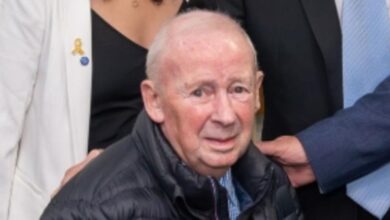Latin America Mourns the Loss of the Dúo Dinámico Resilient Voice

Manuel de la Calva, the Barcelona-born songwriter and singer who helped define Spanish pop in the 1960s and later gifted the world a modern hymn of perseverance, has died in Madrid at the age of 88. Across Spain and Latin America, tributes poured in for the voice that, alongside Ramón Arcusa, became a soundtrack to youth and resilience that never stopped moving people to sing along.
The smile, the red waistcoat, and a soundtrack to youth
He was the “alma” of Dúo Dinámico, remembered for his radiant smile and red waistcoat, which, along with partner Arcusa, transformed variety stages and cinema screens into national living rooms. Their records jumped from radio to theaters—often with starlets like Marisol—and then leapt across the Atlantic. Tours through Argentina, Chile, Peru, Venezuela, Mexico, and Colombia stitched the duo into Latin America’s emotional fabric.
Long before streaming could mint global fandoms overnight, De la Calva helped invent a Spanish version of the phenomenon. He and Arcusa first met as teenagers while working at an aircraft factory in Barcelona. In 1959, they launched as The Dynamic Boys, covering American hits in Spanish and drawing influence from the Everly Brothers, Sinatra, The Platters, and Los Cinco Latinos. Soon, they discovered their own originals could stand beside the covers. By the time they were honored with a medal for more than 1,200 songs, De la Calva laughed that they had “never bothered to count. Others did the counting for us.” What mattered to him was simpler: whether audiences walked away humming.
From Benidorm to Eurovision, and a phone call that changed everything
Spanish pop history rarely unfolds without Dúo Dinámico in the frame. Early songs, such as the now-controversial “Quince años tiene mi amor” and “Quisiera ser,” made them household names. The latter, winning second place at the Benidorm Festival in 1960, nudged them from imitators to hitmakers.
But it was a song they wrote for someone else that secured them a place in Europe’s pop legend. Their tune La la la was meant for Joan Manuel Serrat. When Serrat refused to sing it in Spanish rather than Catalan, Massiel stepped in and carried it to Spain’s first Eurovision victory in 1968—edging out Cliff Richard’s Congratulations. For the duo, it was a strange near-miss, but one that proved their pen could shape musical history as much as their own voices. That win helped catapult Spanish pop into wider circulation, showing how deftly the pair could work behind the curtain as well as on stage.
A song that refused to die, returning when the world needed it most
By the early 1970s, as protest music gained momentum and Spain inched toward transition, the duo began to fade from the spotlight. When they returned, they carried a song destined to outlast them all. Resistiré, written by De la Calva with lyricist Carlos Toro and sparked by a tossed-off phrase from Nobel laureate Camilo José Cela—”the one who resists, wins”—arrived in 1987 with modest certainty.
It gained prominence in 1989 when Pedro Almodóvar featured it in his film ¡Átame! and, astonishingly, decades later, it became the anthem of the pandemic. From Madrid balconies to Mexico City rooftops, from Lima courtyards to Montevideo apartment blocks, people sang “Resistiré” to one another as both a promise and a lifeline.
De la Calva often said its words were “exactly what you feel in the fight for life.” He had proof: during a hospitalization for cancer in 2007, he sang the song with the nurses who cared for him. In that moment, Resistiré was less a pop ballad than a prayer. In a career filled with chart runs and festival triumphs, it was this hymn of perseverance that proved timeless—an anthem that grew more generous with every crisis it accompanied.

Across the ocean and behind the curtain, an authorial powerhouse
The duo’s passport was as full as their catalog. They met Nelson Riddle and Henry Mancini at a Rio festival, toured relentlessly, and when not recording as Dúo Dinámico, they wrote for others. Their fingerprints are on the songs of Nino Bravo, Camilo Sesto, José Vélez, Ángela Carrasco—and, indelibly, Julio Iglesias. Soy un truhán, soy un señor and Me olvidé de vivir carried their unmistakable stamp.
De la Calva never lost sight of why the partnership endured. He often said their “marriage” lasted because respect never faltered. At times, there was competition, but it was always subliminal, always with admiration. Their proudest contribution, he explained, was bringing color to “that Spain in black and white.”
In Latin America, their songs became part of the cultural fabric—polished romance and gentle mischief that accompanied weddings, reconciliations, and late-night drives. Asked to choose a favorite, De la Calva leaned toward “Perdóname,” because so many had told him the song had reconciled couples, saved marriages, and even “helped the demography.” For him, that was the highest arithmetic of music: not charts but lives changed.
Also Read: Colombian Survivor of the Warsaw Ghetto Built A Century of Renewal
Manuel de la Calva’s voice was bright, but his legacy is more colorful. He helped Spain hear itself anew and gave Latin America a mirror in song. And when the world needed a chorus to lean on, he and his partner had already written it. The image that lingers is the one audiences loved: Manolo, forever smiling in that red waistcoat, stepping to the microphone as if the next song might mend something—and, for a few minutes, it did.





